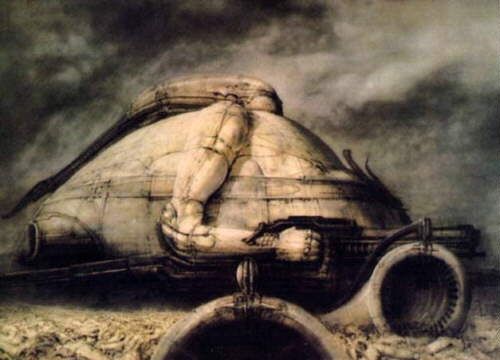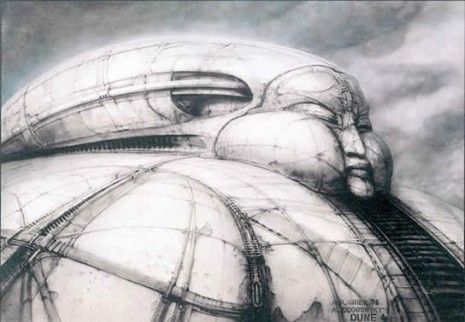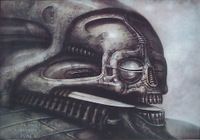Kit Rae
Sr Member
Some interesting comments from Damon Lendelof from interviews he has done in the past few days, now that he can open up about the film somewhat. He confirms what a few of us have surmised from the film.
"I don't want to talk too specifically about what the black goop does. Obviously the characters in the movie are trying to theorize based on what is happening to them. "This thing is a weapon, it's really bad for us." When it interacts with living species, bad things result. So you see little worms and when the black goop gets on the little worms we see what happens to them. And when Fifield gets it all over his face mask, we see what happens to him. When Holloway just has a drop of it in a glass of champagne, we see what happens to him.
We wanted to be purposefully vague, [but steer] the audience towards some conclusions as to what that stuff was supposed to do: Is it supposed to kill you? Is it supposed to transform you—which seems like the most obvious choice—and to what end? Like, why in God's name would the engineers want to create abominations out of mankind? Some of these questions we wanted to answer directly and some of these questions we didn't want to answer directly, which sets you up for a certain level of frustration and disappointment that I am well familiar with, but I'll take it any day of the week because I also feel like it forces you to fire your own imagination.
We clearly have answers for those questions ourselves that we did not present in the movie purposefully, not just because we're saving them for potential sequels, but because the power of the original Alien—or even Blade Runner—is that to a certain degree, we're giving you all the numbers in the equation but we're not adding them up for you. And that's intentional."
"I would say, did we explore the idea of Vickers being a robot? Well, is there anything in the movie that says she’s not? Yes. For us, it was important for Janek to ask the question and for Vickers to say, “Come down to my room, and I’ll show you if I’m a robot or not.” But what does she show him? Can robots in 2093 have sex? That’s as much as we wanted to explain it. I will say this, it sure seems she got crushed pretty hard."
"It's not arbitrary. [But] the movie has to speak for itself. I will say that the theory that is formed by Shaw by the end of the movie—that the black goo is some sort of weapon and it is headed towards earth and if it gets there the result is going to be terrible—[is] based on the information that she has in the movie, but that's not necessarily the correct deduction for her to make. The audience is privy to pieces of the story that Shaw is not. I hope that the movie is one of those films that [is rewarding on] subsequent viewings as opposed to more confusing and more frustrating."
"So he was thinking about that stuff many, many months before he even began photography. And the way that he wanted to play the hits in terms of xenomorphs and face huggers, he wanted to make sure that they looked different than they had in previous movies because of some of the things that we were trying to say in this movie... I've always looked at Prometheus as this huge orgy between three generations of creation. So you have our creators, the engineers; us; and then our creation, the synthetic beings, the androids. And so basically everybody is kind of screwing each other."
"These are questions we can’t help but to wonder about, and it’s in our programming. So, if you gave us the opportunity to answer these questions, we would not stop. We’re dogs at the bone, you know? We gotta go after it, even if we know we’ll probably die in the process or, at the end of that line, are all those things I talked about: disappointment, and that’s the whole point of that conversation between Holloway and David, where David says, “Why did you make me?,” and Holloway says, “Because we could.” David tells him to imagine how disappointing it would be if that’s what your makers told you, and it’s completely and totally true. When David asks Holloway what he would do to get his answers, after saying all that, Holloway doesn’t even hesitate, saying, “Anything and everything.”
"They all have a role in the end result of this movie. None of it would have happened had David not taken that little drop of goo that was generated from the engineers and spiked Holloway's drink with it and then Holloway has sex with Shaw and then their baby essentially ends up infecting the person who started it all, the engineers. So it goes full circle."
"One of the things I think is really cool about David, as a character and Fassbender’s portrayal of him, is that there’s no part of David that wants to be a real boy. He is not enamored by humanity or jealous by our ability to experience emotions. He’s basically thinking, “You’re morons.”"
And one more quote regarding the science of Prometheus...
"John Spates did a tremendous amount of research in terms of interspace travel, cryonics, artificial intelligence. You're also married to the original Alien in a lot of ways—this is 30 years before that, so can we present our gadgetry so that it doesn't look like it's backwards, considering that movie was made 30 years ago? The Nostromo was a mining ship. It's going to be completely and totally dressed down. The computers are going to do the bare minimum of computing because its only job is to get from A to B and then mine, whereas the Prometheus is designed as a science vessel to basically answer the meaning of life. So that's the way you get around that issue. And Arthur Max, who was the production designer, designed all the ships and the Alien landscapes, and he had a whole slew of advisors that he [checked with].
There was a NASA guy that came in a couple of times and spoke to Ridley and us about the theoretical realities of extraterrestrial life. If you're trying for it to feel real and there's any degree of veracity, it's absolutely critical to have that stuff. But as a storyteller you kind of have to say: It's really good to know it, but we are writing a movie."
"I don't want to talk too specifically about what the black goop does. Obviously the characters in the movie are trying to theorize based on what is happening to them. "This thing is a weapon, it's really bad for us." When it interacts with living species, bad things result. So you see little worms and when the black goop gets on the little worms we see what happens to them. And when Fifield gets it all over his face mask, we see what happens to him. When Holloway just has a drop of it in a glass of champagne, we see what happens to him.
We wanted to be purposefully vague, [but steer] the audience towards some conclusions as to what that stuff was supposed to do: Is it supposed to kill you? Is it supposed to transform you—which seems like the most obvious choice—and to what end? Like, why in God's name would the engineers want to create abominations out of mankind? Some of these questions we wanted to answer directly and some of these questions we didn't want to answer directly, which sets you up for a certain level of frustration and disappointment that I am well familiar with, but I'll take it any day of the week because I also feel like it forces you to fire your own imagination.
We clearly have answers for those questions ourselves that we did not present in the movie purposefully, not just because we're saving them for potential sequels, but because the power of the original Alien—or even Blade Runner—is that to a certain degree, we're giving you all the numbers in the equation but we're not adding them up for you. And that's intentional."
"I would say, did we explore the idea of Vickers being a robot? Well, is there anything in the movie that says she’s not? Yes. For us, it was important for Janek to ask the question and for Vickers to say, “Come down to my room, and I’ll show you if I’m a robot or not.” But what does she show him? Can robots in 2093 have sex? That’s as much as we wanted to explain it. I will say this, it sure seems she got crushed pretty hard."
"It's not arbitrary. [But] the movie has to speak for itself. I will say that the theory that is formed by Shaw by the end of the movie—that the black goo is some sort of weapon and it is headed towards earth and if it gets there the result is going to be terrible—[is] based on the information that she has in the movie, but that's not necessarily the correct deduction for her to make. The audience is privy to pieces of the story that Shaw is not. I hope that the movie is one of those films that [is rewarding on] subsequent viewings as opposed to more confusing and more frustrating."
"So he was thinking about that stuff many, many months before he even began photography. And the way that he wanted to play the hits in terms of xenomorphs and face huggers, he wanted to make sure that they looked different than they had in previous movies because of some of the things that we were trying to say in this movie... I've always looked at Prometheus as this huge orgy between three generations of creation. So you have our creators, the engineers; us; and then our creation, the synthetic beings, the androids. And so basically everybody is kind of screwing each other."
"These are questions we can’t help but to wonder about, and it’s in our programming. So, if you gave us the opportunity to answer these questions, we would not stop. We’re dogs at the bone, you know? We gotta go after it, even if we know we’ll probably die in the process or, at the end of that line, are all those things I talked about: disappointment, and that’s the whole point of that conversation between Holloway and David, where David says, “Why did you make me?,” and Holloway says, “Because we could.” David tells him to imagine how disappointing it would be if that’s what your makers told you, and it’s completely and totally true. When David asks Holloway what he would do to get his answers, after saying all that, Holloway doesn’t even hesitate, saying, “Anything and everything.”
"They all have a role in the end result of this movie. None of it would have happened had David not taken that little drop of goo that was generated from the engineers and spiked Holloway's drink with it and then Holloway has sex with Shaw and then their baby essentially ends up infecting the person who started it all, the engineers. So it goes full circle."
"One of the things I think is really cool about David, as a character and Fassbender’s portrayal of him, is that there’s no part of David that wants to be a real boy. He is not enamored by humanity or jealous by our ability to experience emotions. He’s basically thinking, “You’re morons.”"
And one more quote regarding the science of Prometheus...
"John Spates did a tremendous amount of research in terms of interspace travel, cryonics, artificial intelligence. You're also married to the original Alien in a lot of ways—this is 30 years before that, so can we present our gadgetry so that it doesn't look like it's backwards, considering that movie was made 30 years ago? The Nostromo was a mining ship. It's going to be completely and totally dressed down. The computers are going to do the bare minimum of computing because its only job is to get from A to B and then mine, whereas the Prometheus is designed as a science vessel to basically answer the meaning of life. So that's the way you get around that issue. And Arthur Max, who was the production designer, designed all the ships and the Alien landscapes, and he had a whole slew of advisors that he [checked with].
There was a NASA guy that came in a couple of times and spoke to Ridley and us about the theoretical realities of extraterrestrial life. If you're trying for it to feel real and there's any degree of veracity, it's absolutely critical to have that stuff. But as a storyteller you kind of have to say: It's really good to know it, but we are writing a movie."
Last edited:




